- Home
- Quizzes
- My Quiz Activity
- Newsletters
- Sports Betting
- MY FAVORITES
- Add Sports/Teams
- SPORTS
-
NFL
- NFL Home
- Arizona Cardinals
- Atlanta Falcons
- Baltimore Ravens
- Buffalo Bills
- Carolina Panthers
- Chicago Bears
- Cincinnati Bengals
- Cleveland Browns
- Dallas Cowboys
- Denver Broncos
- Detroit Lions
- Green Bay Packers
- Houston Texans
- Indianapolis Colts
- Jacksonville Jaguars
- Kansas City Chiefs
- Las Vegas Raiders
- Los Angeles Chargers
- Los Angeles Rams
- Miami Dolphins
- Minnesota Vikings
- New England Patriots
- New Orleans Saints
- New York Jets
- New York Giants
- Philadelphia Eagles
- Pittsburgh Steelers
- San Francisco 49ers
- Seattle Seahawks
- Tampa Bay Buccaneers
- Tennessee Titans
- Washington Commanders
-
MLB
- MLB Home
- Arizona Diamondbacks
- Atlanta Braves
- Baltimore Orioles
- Boston Red Sox
- Chicago White Sox
- Chicago Cubs
- Cincinnati Reds
- Cleveland Guardians
- Colorado Rockies
- Detroit Tigers
- Houston Astros
- Kansas City Royals
- Los Angeles Angels
- Los Angeles Dodgers
- Miami Marlins
- Milwaukee Brewers
- Minnesota Twins
- New York Yankees
- New York Mets
- Oakland Athletics
- Philadelphia Phillies
- Pittsburgh Pirates
- San Diego Padres
- San Francisco Giants
- Seattle Mariners
- St. Louis Cardinals
- Tampa Bay Rays
- Texas Rangers
- Toronto Blue Jays
- Washington Nationals
-
NBA
- NBA Home
- Atlanta Hawks
- Boston Celtics
- Brooklyn Nets
- Charlotte Hornets
- Chicago Bulls
- Cleveland Cavaliers
- Dallas Mavericks
- Denver Nuggets
- Detroit Pistons
- Golden State Warriors
- Houston Rockets
- Indiana Pacers
- Los Angeles Clippers
- Los Angeles Lakers
- Memphis Grizzlies
- Miami Heat
- Milwaukee Bucks
- Minnesota Timberwolves
- New Orleans Pelicans
- New York Knicks
- Oklahoma City Thunder
- Orlando Magic
- Philadelphia 76ers
- Phoenix Suns
- Portland Trail Blazers
- Sacramento Kings
- San Antonio Spurs
- Toronto Raptors
- Utah Jazz
- Washington Wizards
-
NHL
- NHL Home
- Anaheim Ducks
- Boston Bruins
- Buffalo Sabres
- Calgary Flames
- Carolina Hurricanes
- Chicago Blackhawks
- Colorado Avalanche
- Columbus Blue Jackets
- Dallas Stars
- Detroit Red Wings
- Edmonton Oilers
- Florida Panthers
- Los Angeles Kings
- Minnesota Wild
- Montreal Canadiens
- Nashville Predators
- New Jersey Devils
- New York Islanders
- New York Rangers
- Ottawa Senators
- Philadelphia Flyers
- Pittsburgh Penguins
- San Jose Sharks
- Seattle Kraken
- St. Louis Blues
- Tampa Bay Lightning
- Toronto Maple Leafs
- Utah Hockey Club
- Vancouver Canucks
- Vegas Golden Knights
- Washington Capitals
- Winnipeg Jets
- NCAAF
- NCAAM
- Olympics
- Boxing
- Entertainment
- Lifestyle
- Golf
- MMA
- Soccer
- Tennis
- Wrestling
- More Sports
- RESOURCES
- My Account
- YB on Facebook
- YB on Twitter
- YB on Flipboard
- Contact Us
- Privacy Policy
- Terms of Service
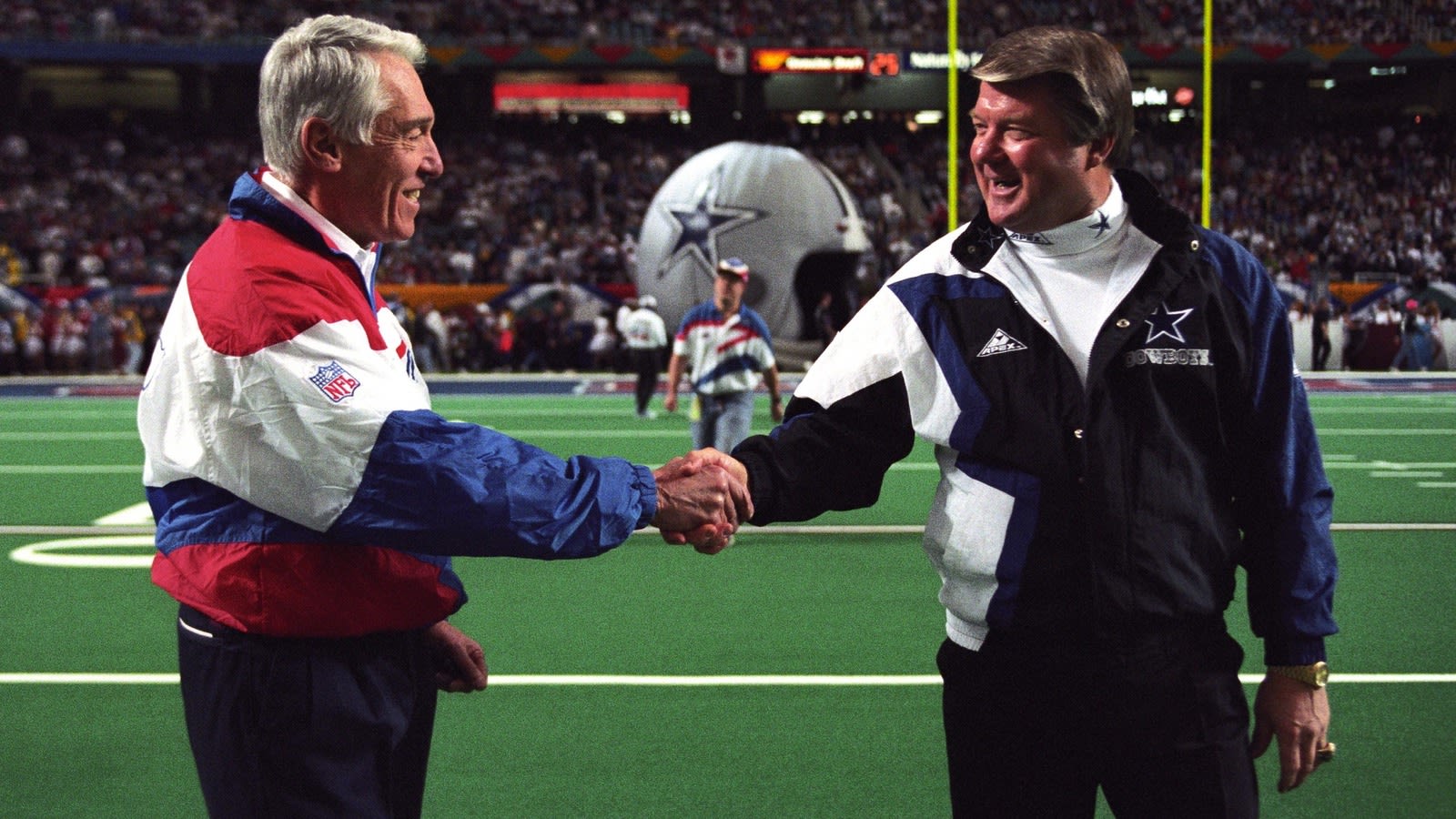
Looking back at the final season for every NFL Hall of Fame coach
The 2024 NFL offseason has brought significant change, with Bill Belichick and Pete Carroll gone from their long-held coaching posts. As multiple greats move away from their best-known positions, here is a look at how the 29 NFL Hall of Fame coaches wrapped their careers.
Tony Dungy, 2008
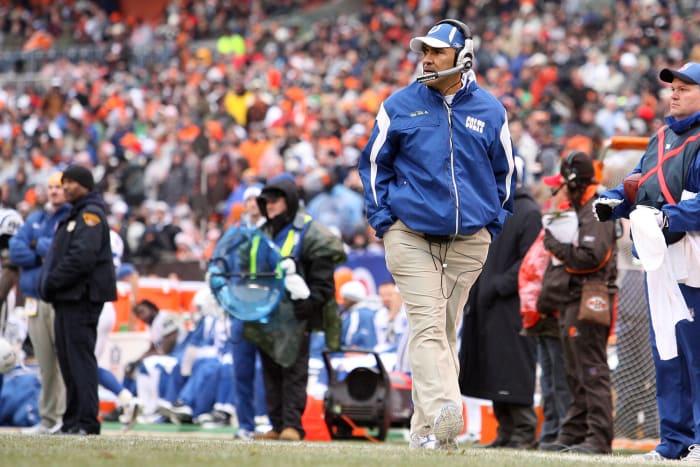
Dungy announced shortly after the 2008 season, his seventh with the Colts, that he was walking away. The former Chuck Noll pupil spent 13 seasons as a head coach, reviving the Buccaneers and getting the Colts back on track. Two years after winning the Colts their first Super Bowl in Indianapolis, the defensive-minded HC led the team on a nine-game win streak to close out the 2008 season. Peyton Manning won his third MVP award. Darren Sproles' playoff all-purpose yardage record sank the 12-4 Colts in an overtime wild-card loss to the 8-8 Chargers. Dungy informed Jim Irsay of his decision soon after, and the Colts installed QBs coach Jim Caldwell as HC, venturing to the Super Bowl the next season.
Joe Gibbs, 2007

The most recent Washington coach to win a playoff game, Gibbs came out of retirement in 2004, taking the reins back once sought-after HC Steve Spurrier proved unfit. A three-time Super Bowl winner during his first Washington stay, Gibbs led the team to two playoff berths in his four-season second run. The '07 team went 9-7. The outfit lost starting QB Jason Campbell late that season, a year that also brought Sean Taylor's tragic death. Washington beat the eventual champion Giants with backup Todd Collins that December. The Seahawks, however, eliminated Washington in a 35-14 wild-card game. Seeing son/assistant Coy Gibbs return to Joe Gibbs' NASCAR team, the Hall of Famer retired again months later.
Bill Cowher, 2006

Cowher opted to stay on to help the Steelers attempt to defend their Super Bowl title, but rumors about his departure proved accurate a year later. The Steelers finished 8-8 in Cowher's finale, wrapping a 15-year stay for the popular coach. Ben Roethlisberger sustained injuries in a motorcycle crash and underwent an appendectomy, but he only missed one game. Cowher was 49 when he stepped down, and although the fiery leader considered leaving after Super Bowl XL, he did not frame his exit as a true retirement. More than 15 years later, Cowher has not returned to coaching. Finding a home at CBS, Cowher gave way to Vikings defensive coordinator Mike Tomlin, who has lasted 17 seasons.
Bill Parcells, 2006

Parcells retired after Super Bowl XXV due to a heart issue and left New York again following the 1999 season, but Jerry Jones lured him back. The Big Tuna helped the Cowboys to two playoff berths, 2003 and in his final season. Not exactly a fan of Terrell Owens, whom Jones signed in 2006, Parcells paired the mercurial wideout with Tony Romo. Parcells parked Drew Bledsoe for Romo in October '06. The former UDFA lasted 10 seasons as Dallas' starter, but his first ended when he dropped the snap on a go-ahead field goal in Seattle as the Cowboys lost to the Seahawks in the NFC wild-card round. Parcells resurfaced as the Dolphins' executive VP in 2008, while Jones hired Chargers DC Wade Phillips to replace him.
Dıck Vermeil, 2005
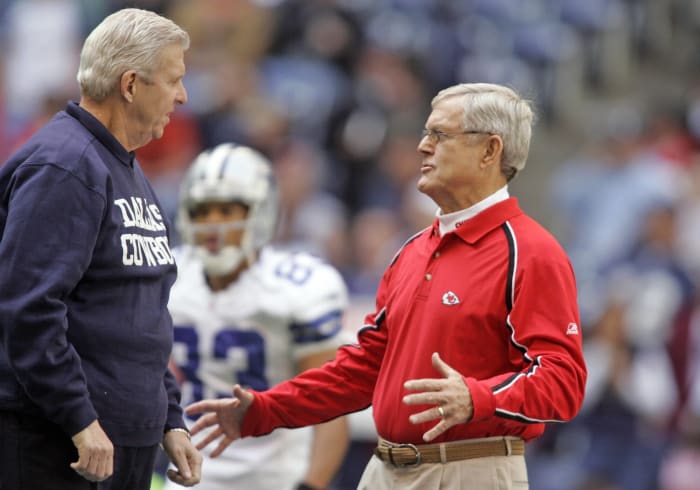
In place as Chiefs head coach for five seasons, Vermeil told his team he was leaving the day before its season finale. Vermeil joined Parcells in retiring three times, leaving the Eagles due to burnout in 1983 and stepping down after leading the Rams to a Super Bowl XXXIV win 17 years later. The emotional leader and OC Al Saunders installed an explosive offense in Kansas City, featuring Hall of Famers Tony Gonzalez, Will Shields and Willie Roaf, but could not find enough help on defense. The '05 Chiefs finished 10-6, however, and rated as one of DVOA's best teams to miss the playoffs. The Chiefs then sent a fourth-round pick to the Jets for ex-Vermeil Eagles charge Herm Edwards.
Jimmy Johnson, 1999

Convinced by Dolphins ownership to return for the 1999 season, Johnson guided the team to a third straight playoff appearance. But the '99 campaign doubled as the outro for Johnson and Dan Marino. The two-time Super Bowl-winning HC returned to Miami in 1996, replacing Don Shula after spending two years out of football. The Jerry Jones divorce stalled the Cowboys' momentum, and while that dynasty's architect did not have a losing season in Miami, the Dolphins (9-7 in 1999) stalled in the divisional round. The Dolphins cut Marino for cap purposes soon after, and the 17-year QB retired not long after the Jaguars' 62-7 Round 2 rout. Two-time Johnson assistant Dave Wannstedt took the reins.
Marv Levy, 1997

Levy walked away a year after Jim Kelly's retirement, with Buffalo's offense slipping after the Hall of Fame QB's exit. The Bills finished 6-10, losing six of their final seven, and finished 29th on offense. Kelly heir apparent Todd Collins only ended up getting this season as a true starter, giving way to the Rob Johnson-Doug Flutie controversy by 1998. Ownership wanted Levy to make changes to his offensive staff. Disagreeing, the 72-year-old leader retired rather than break George Halas' record for oldest head coach in NFL history. The four-time AFC champion HC returned as Bills GM from 2006-07; defensive coordinator Wade Phillips succeeded Levy on the sideline.
Don Shula, 1995

Shula still holds the NFL's all-time wins record, running it to 347 with a Week 17 win over the Rams. The Bills then won a one-sided wild-card game. While Shula had aimed to coach out his contract, which ran through 1996, mounting criticism — targeting his 22 seasons without a Super Bowl win — led the 26th-year Miami coach to retire. The Dolphins started 4-0 in 1995 but finished 9-7, after an offseason splurge led oddsmakers to place them as AFC favorites. Miami, which booked playoff berths in four of Shula's final six seasons, yielded 341 rushing yards in its wild-card loss. Ex-Miami Hurricanes staple Jimmy Johnson replaced Shula.
Tom Flores, 1994

Flores' Raiders accomplishments belatedly landed him in Canton, but his Seahawks stay kept him out for over 25 years. Taking over as Seahawks GM in 1989, Flores moved back to the sideline in 1992. The Seahawks went 2-14 that season and, as 1993 No. 3 overall pick Rick Mirer began an unsuccessful run as Seattle's QB, ownership canned Flores and his entire staff. The Seahawks went 6-10 in Flores' third season, and attendance plummeted. Despite Chris Warren's 1,500-yard rushing season, the team ranked 20th offensively and lost six straight midseason. Former Miami Hurricanes national title-winning HC Dennis Erickson took over in 1995.
Chuck Noll, 1991

On the heels of back-to-back seasons short of the playoffs, Noll made an abrupt decision to retire after 23 seasons in Pittsburgh. The Steeler legend stepped away after a 7-9 season, one that featured a transition from Bubby Brister to Neil O'Donnell at quarterback. Since Noll's four Super Bowl wins from 1974-79, the Steelers had only posted one 10-win season (1983) in his final 12. They did advance to four playoff brackets, voyaging to the 1984 AFC title game, but quickly tumbled off their storied perch. The stoic ex-Don Shula Colts assistant was 58 when he retired. The Steelers have employed two head coaches (Bill Cowher, Mike Tomlin) since.
Tom Landry, 1988

Landry mentioned retirement in the late 1980s but stayed on through a 3-13 1988 season. The Cowboys' 29-year coach, whose final Super Bowl berth came 10 years prior, eventually said he planned to coach into the '90s. Jerry Jones changed that. Buying the Cowboys in February 1989, Jones divided Cowboys fans by firing Landry at a golf course. Fellow cornerstone Tex Schramm, Dallas' GM, also wound up shoved out as the Jones-Jimmy Johnson duo rebuilt. The '88 Cowboys started 2-2 before losing 10 straight, despite Herschel Walker's 1,500-yard year, with ex-Danny White backup Steve Pelluer starting 14 games. A year later, the Cowboys went 1-15 behind No. 1 pick Troy Aikman and sent Walker to the Vikings for a franchise-reshaping haul.
Bill Walsh, 1988

Tormented and burned out during a 10-6 season, Walsh made a secret midseason pledge to retire. The 49ers, however, smashed the gas pedal at the right time, stampeding through the NFC playoffs before their revered Joe Montana-piloted game-winning drive downed the Bengals in Super Bowl XXIII. Deciding on Montana over Steve Young to close a high-profile QB controversy during the 1988 slate, Walsh remains one of the all-time greats even though he was an NFL HC for just 10 years. The West Coast Offense innovator later regretted retiring when he did, as successor George Seifert's 1989 team went 14-2 and joins Walsh's '84 squad on the short list among the best ever.
Don Coryell, 1986

Coryell did not finish his career on his terms, resigning midway through the 1986 season. The Chargers' Air Coryell nucleus had seen its best days pass, with Dan Fouts in his penultimate season. Coryell relayed his decision to ownership after a 1-7 Bolts start, leaving the team he once took over midseason (in 1978). The Chargers named assistant Al Saunders their new HC, but the 39-year-old staffer had already assumed more responsibility going into the '86 season and was positioned as the heir apparent. This led to Coryell being stripped of some duties, as Saunders readied. Coryell, 62 at the time, had led the Bolts to four playoff berths. Saunders stayed as HC through 1989.
Bud Grant, 1985

Grant retired after the 1983 season but re-emerged in an unexpected encore two years later. Following a franchise-worst record (3-13) under Les Steckel in 1984, the Vikings lured Grant back. Grant's 18th and final season produced a 7-9 record, with Fran Tarkenton successor Tommy Kramer in his seventh season as a starter. Citing aspirations off the field, Grant walked away once again. The Vikings again promoted from within, elevating longtime offensive coordinator Jerry Burns to take over. Burns lasted six seasons, which included three playoff berths from 1987-89. Grant had coached the Vikes to four Super Bowls.
John Madden, 1978

Madden left coaching at just 42, stepping down from his Raiders post after 10 seasons. At the time, Madden cited burnout and an ulcer condition. Despite his young age, Madden said at his farewell press conference he would never coach again. The future broadcasting icon stuck to that pledge. Madden's .759 win percentage is the NFL's best mark since 1930; he sits well north of Vince Lombardi (.738) on that list despite a 9-7 1978 season. Entering 1978, Oakland had ventured to five straight AFC championship games, winning Super Bowl XI in that time. The Broncos, who ousted the Raiders in the 1977 AFC title game, edged them for the '78 AFC West crown. Ex-Raiders QB Tom Flores replaced Madden.
George Allen, 1977

Allen's NFL exit can be split into two parts. While Allen's final season as a head coach came in Washington, he returned to the Rams — whom he coached from 1966-70 — before being fired ahead of the 1978 season. In 1977, Allen toggled QBs Billy Kilmer and Joe Theismann during a 9-5 Washington campaign. The team's Super Bowl VII starter, who was 38 by the '77 season, gave way to the younger Theismann midway through the season. But Allen moved Kilmer back into the lineup for the team's final two games, both wins. Washington, which narrowly missed the playoffs, then booted Allen after failed extension talks. With players griping about being overworked, the Rams fired Allen after two preseason games in 1978.
Hank Stram, 1977

Stram took over the Saints in 1976, returning to the sideline after his 15-year Texans/Chiefs tenure wrapped. But the loquacious head coach did not have Archie Manning available throughout that season — a 4-10 showing. Even with Manning back in 1977, the Saints went 3-11. New Orleans ranked 26th defensively and infamously snapped the Buccaneers' 26-game losing streak; Tampa Bay routed New Orleans 33-14 in Week 13. Just more than a week later, two of owner John Mecom's lieutenants told Stram he was being fired. The Saints had given the Super Bowl-winning HC a 10-year deal to change their fortunes, but the struggling franchise moved on quickly.
Paul Brown, 1975

The legendary offensive innovator coached the Bengals for eight seasons, but the owner/HC moved off the sideline for good following the 1975 campaign. This came after Brown's best record with the Bengals, an 11-3 mark. Cincinnati's offense featured future MVP Ken Anderson targeting speedster Isaac Curtis and future Hall of Famer Charlie Joiner, and assistant Bill Walsh using his future West Coast offense. The Raiders held off a Bengals rally in the divisional round, and Brown retired 67 days later. The ex-Browns czar made a mistake upon leaving, promoting O-line coach Bill Johnson over Walsh, who left the team in disappointment. Johnson lasted three seasons in charge.
Sid Gillman, 1974
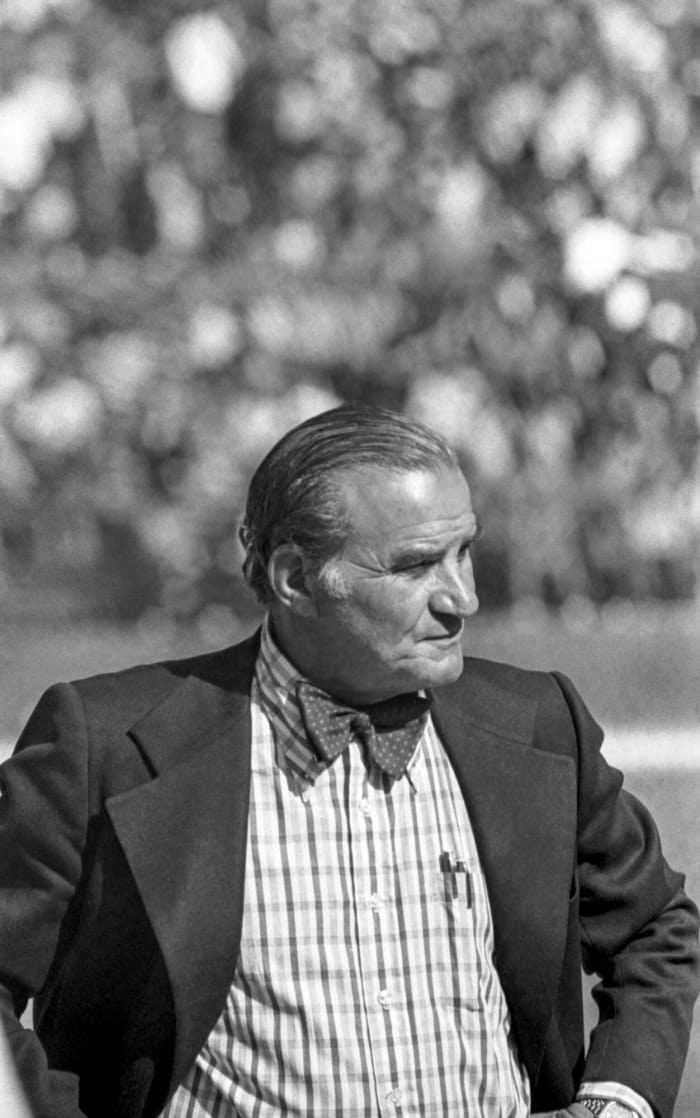
The passing innovator's Chargers tenure ended after the 1971 season, but he resurfaced as GM in Houston. Displaying no issue intervening during Bill Peterson's dreadful head-coaching stay, Gillman took over after Peterson followed up a 1-13 1972 season with an 0-5 start in '73. With Gillman as the Oilers' HC throughout 1974, they showed progress by finishing 7-7. Houston started 1-5 that season, rallying late, but Gillman reunited with ex-Chargers assistant Bum Phillips and installed him as head coach in 1975. A falling out with Phillips, due to roster control, led to Gillman resigning as GM that year. He finished his career as Bears offensive coordinator in 1977.
Weeb Ewbank, 1973

The only coach to win NFL, AFL and Super Bowl titles, Ewbank walked away after 11 seasons with the Jets. A nine-year Baltimore Colts leader before that run, Ewbank closed out his career with a 4-10 record. Joe Namath continued to deal with injuries, and Ewbank's finale doubled as the day O.J. Simpson surpassed 2,000 rushing yards in a 34-14 Bills romp at Shea Stadium. Fans had grown tired of Ewbank by 1973, with the Jets having not advanced to the playoffs since winning Super Bowl III five years earlier. Ewbank, 66 at the time, had announced before training camp he would retire. He handed the team to son-in-law Charley Winner, an ex-Cardinals HC who did not last two seasons.
Vince Lombardi, 1969

Retiring from his Packers post after an NFL three-peat, Lombardi missed coaching while working as Green Bay's GM in 1968. The five-time NFL champion HC resurfaced in Washington, leading the team to its first winning record since 1955. The legendary leader coached Hall of Famers Sonny Jurgensen, Charley Taylor and Chris Hanburger in Washington. Larry Brown, who won MVP honors to help the 1972 team advance to Super Bowl VII, made the first of four Pro Bowls in his first and only season under Lombardi. The '69 team went 7-5-2. Intent on coaching a second season in Washington, Lombardi became stricken with colon cancer. Appointing offensive coordinator Bill Austin as head coach in the summer of 1970, Lombardi died on Sept. 3 at age 57.
George Halas, 1967

Halas retired as both the winningest coach in NFL history (312 victories) and the oldest (at 72). But the six-time NFL champion did not determine until May 1968 he would walk away. An arthritic hip limited Halas' movement, and he decided — to the surprise of his players — he was too limited to keep going as a head coach. A player-coach of the Bears at their 1920 inception (as the Decatur Staleys), Halas coached 40 seasons, taking time away during World War II and at other points. In 1967, the Bears finished 7-6-1. A pre-injury Gale Sayers shined, while Dıck Butkus led a No. 4-ranked defense. Chicago's passing game struggled, and the team started 2-5. Defensive coordinator Jim Dooley took over in 1968, lasting four seasons.
Curly Lambeau, 1953

Founder of the Packers, Lambeau left his original team in a dispute. He finished his career coaching the Cardinals for two seasons (1950-51) and Washington for his final two. Sammy Baugh retired following the 1952 season, though the '53 Washington team improved (after a 4-8 showing in the Baugh-Lambeau year) and finished 6-5-1. Preparing to coach Washington in 1954, Lambeau engaged in an argument with owner George Preston Marshall. The unpopular owner fired Lambeau after the altercation at a Sacramento hotel. The team had been in town for a preseason game against the 49ers. Lambeau, 55 at the time, exited with six NFL titles (all with the Packers); his 226 wins remain sixth all time.
Steve Owen, 1953

The NFL lost two of its three winningest coaches following the 1953 season. Owen beat Lambeau out the door, announcing before the Giants' final game he would resign. The Giants had slipped to 3-9 by 1953. Although Hall of Fame defenders Emlen Tunnell and Arnie Weinmeister resided on the defense-oriented Owen's club, the momentum Owen's team carried during his heyday had faded. Despite rostering Frank Gifford and Charley Conerly, the Giants ranked last offensively. Owen coached in eight NFL championship games, winning two, during his 23-year tenure. He stayed with the team in a scouting role; Jim Lee Howell took over as HC, guiding the Giants back to promine`bosh rnce.
Greasy Neale, 1950
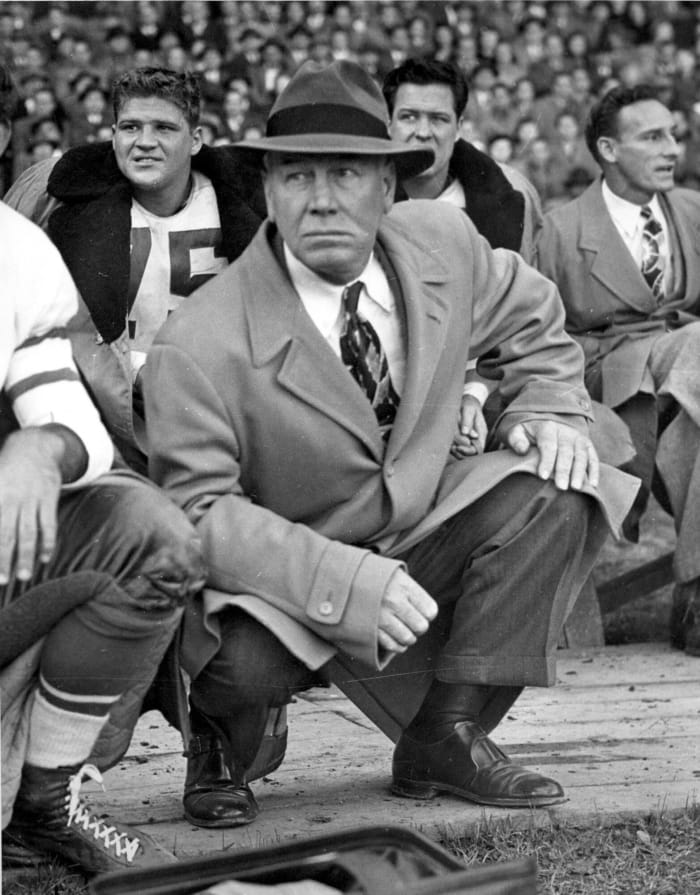
Neale's Eagles tenure ended abruptly when Eagles owner Jim Clark fired him in February 1951. This came despite the Eagles having won back-to-back NFL titles from 1948-49. The 1950 Eagles lost perhaps the most famous Week 1 game in league history, seeing the Browns, the All-American Football Conference dynasty, win their NFL debut 35-10. Neale criticized Cleveland's passing reliance, and Paul Brown's team won the December rematch in a run-dominant affair. Injuries to backfield mainstays Steve Van Buren and Bosh Pritchard stung the Eagles, and a Neale-Clark shouting match ensued after a November loss to the Giants. The second-year owner fired Neale via telegram months later, ending a 10-year tenure.
Ray Flaherty, 1949

Best known for coaching Washington to two championships in the NFL, Flaherty left his post after the 1942 season — which featured he and Sammy Baugh collecting their second titles — to serve in World War II. Flaherty resurfaced in the All-American Football Conference, taking over the New York Yankees in 1946. After being fired during the '48 season, Flaherty took over the AAFC's Chicago Hornets in 1949. The Hornets lost their final five games, and the AAFC's ensuring merger with the NFL did not involve the Chicago franchise. Coaching Washington for just six years, Flaherty nevertheless led the team to four NFL title games.
Jimmy Conzelman, 1948

After Conzelman had left his Cardinals post for an MLB gig in 1943, the team brought him back as head coach in 1946. The roster he returned to was better than the one he left. Owner Charles Bidwill's "Million Dollar Backfield," which centered around No. 1 pick Charley Trippi, stormed to the 1947 NFL title — the Cardinals' most-recent championship. A year later, the Eagles downed the Cards on a snow-blanketed field for the crown. The 1948 Cardinals finished 11-1, the best mark in team history, but Conzelman left to devote more time to his ad agency in 1949. This effectively illustrates pro football's place in the sports lexicon at the time.
Guy Chamberlin, 1927

Throughout Chamberlin's six-year coaching career, he also served as a player for the three franchises he led. After guiding the Canton Bulldogs and Frankford Yellow Jackets to four titles from 1922-26, Chamberlin finished his career with the Chicago Cardinals in 1927. His .784 win percentage, in just 81 games, remains the best in NFL coaching history. At 33, Chamberlin played sparingly for a Cardinals team that finished 3-7-1. Also a 1920 All-Decade-teamer at his career's end, Chamberlin was inducted into the Hall of Fame as part of its third class in 1965.
Fritz Pollard, 1925

In the Hall of Fame more for his contributions than sheer coaching success, Pollard was an NFL trailblazer. He served as an NFL coach decades before Art Shell broke that barrier for Black leaders in the modern game. Pollard served as a co-coach for the 1921 Akron Pros, in the NFL's second year of existence (then the AFCA), and spent time coaching at points in the years to follow. Pollard's final NFL coaching work is believed to have come in 1925, when he coached one game with the Hammond Pros.
Sam Robinson is a sportswriter from Kansas City, Missouri. He primarily covers the NFL for Yardbarker. Moving from wildly injury-prone sprinter in the aughts to reporter in the 2010s, Sam set up camp in three time zones covering everything from high school water polo to Division II national championship games. He has since settled in as the husband of a track and field coach, concentrating on the NFL. Boasting an unhealthy interest in the league’s history and fashion trends, Sam is the lead writer for Pro Football Rumors and has written about the sport for Yardbarker since 2018. In addition to working as a writer/editor for a few newspapers – the Cleveland Plain Dealer and St. Joseph (Missouri) News-Press, to name two – in a former life that included some awkward awards-show hosting gigs thankfully inaccessible online, Sam has written about the Olympics for The Athletic.
More must-reads:
- 25 NFL players who are declining in 2024
- Giants make veteran signing in wake of key injury
- The 'No. 3 NFL draft pick' quiz
Breaking News
Customize Your Newsletter
 +
+
Get the latest news and rumors, customized to your favorite sports and teams. Emailed daily. Always free!
Use of this website (including any and all parts and
components) constitutes your acceptance of these
Terms of Service and Privacy Policy.
This site is for entertainment purposes only.
There is no gambling offered on this site.
Gambling Problem? Call 1-800-Gambler.
